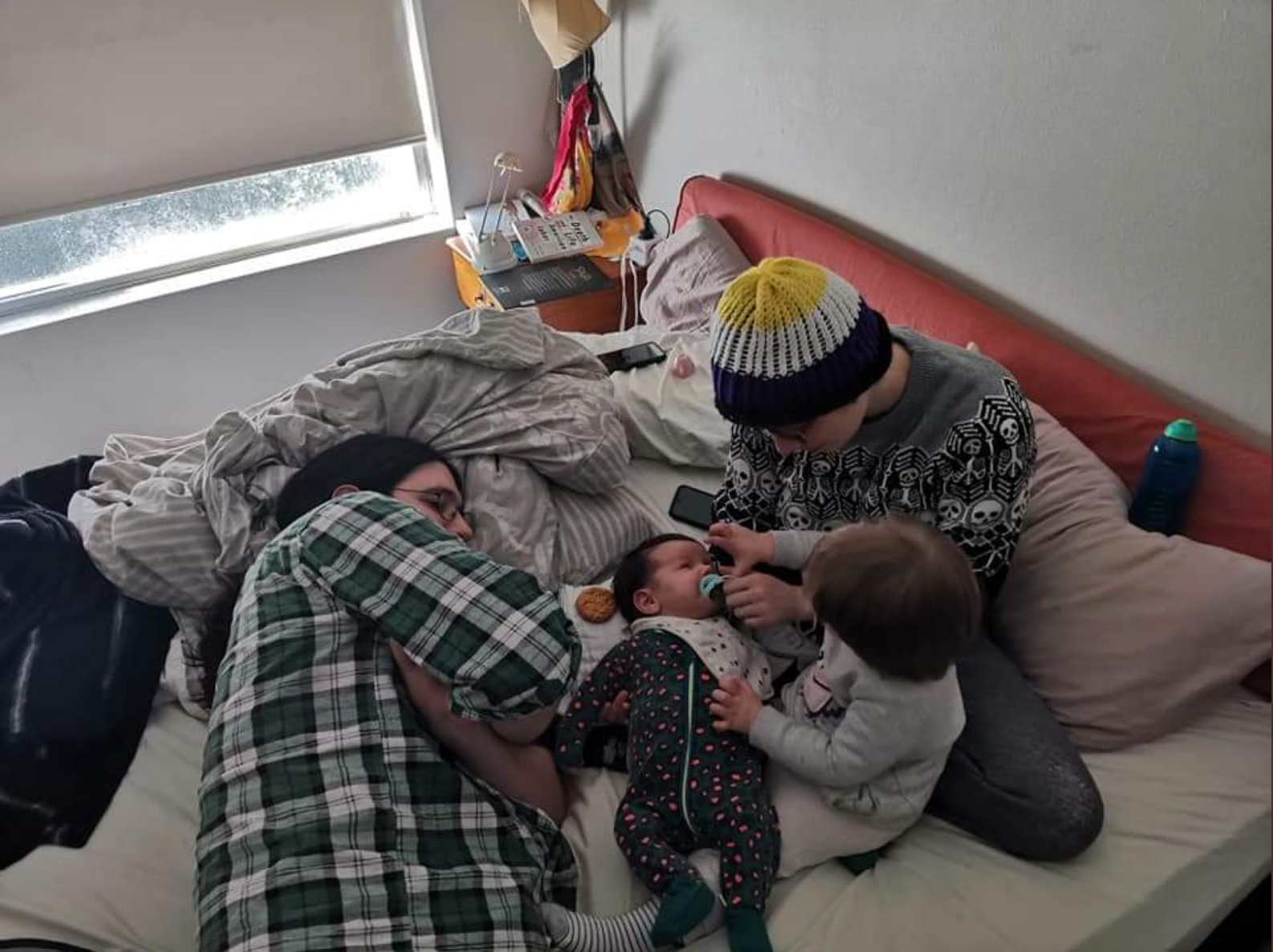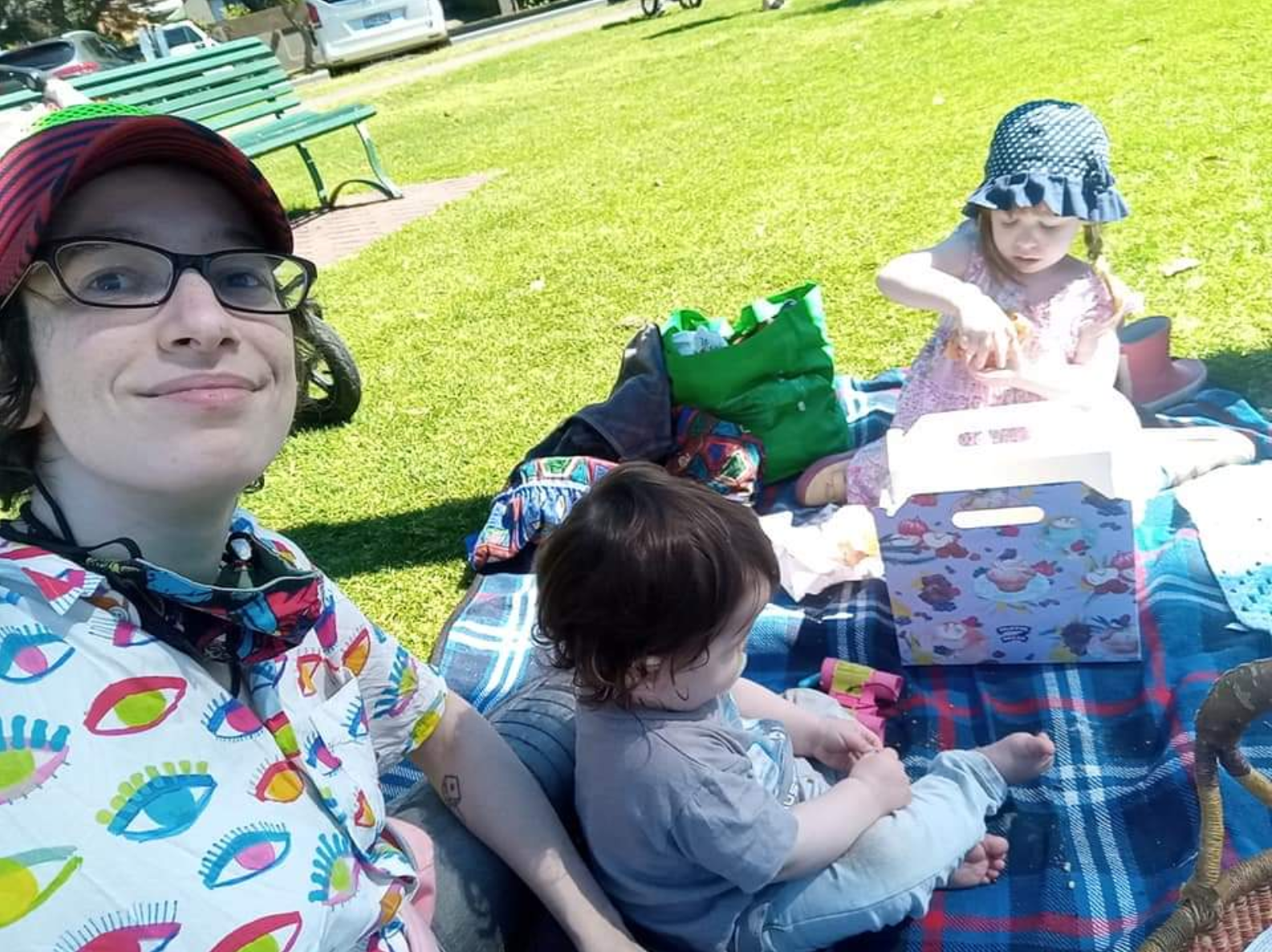Maggie's renting story: Living in and Leaving Affordable Housing
27/04/2022 • Maggie
Maggie has lived in an Affordable Housing apartment with their partner and children for three-and-a-half years. They're about to move out, into a property they'll be privately renting from some family members.
As part of the Make Renting Fair #MyRentedHome social media week of action, Maggie their experience of renting in Affordable Housing.
Maggie has given us permission to republish their tweet thread as a guest blog for This Rented Life.
See Riley's explainer below for more info about 'Affordable Housing' as a specific model of rental housing.

We're moving out of our Affordable Housing flat in a few weeks so how about a thread on what the last three and a half years here have been like.#MyRentedHome #MakeRentingFair
— MK (@vonbees) April 7, 2022
The shortage of social housing stock in Australia means long waitlists across the board. We got in quick but we think we accidentally a loophole - when we applied, our incomes were in the top band, but we moved in at $33k/year...#MyRentedHome
— MK (@vonbees) April 7, 2022
...because they didn't read our application carefully and understand that we were planning on at least two alternating years of unpaid parental leave. Affordable Housing is semi-privatised & higher-income residents partly subsidise the others.#MyRentedHome
— MK (@vonbees) April 7, 2022
We're about to be a two-income household again but living here was absolutely load-bearing for the unpaid parental leave plan. Affordable Housing charges 25-30% of your income in rent, up to a certain cap. #MyRentedHome
— MK (@vonbees) April 7, 2022
That makes it fantastic for people on a low, stable income and kind of shit for anyone whose pay changes significantly from fortnight to fortnight - the rent review paperwork is a pain and I imagine doing it more often would feel like being on Centrelink again #MyRentedHome
— MK (@vonbees) April 7, 2022
Knowing we'd probably wind up above their max income bracket eventually made it really hard to treat the place like #MyRentedHome tho. As a double ADHD household, putting in a maintenance/alteration request taxes limited executive function enough without the motivation dampener!
— MK (@vonbees) April 7, 2022
There is some safety in being the responsibility of a corporate bureaucracy, but sometimes a private landlord with a human face is easier to deal with. I've been trying to get a mosquito net on the bedroom window on and off for some time as a question of safety... #MyRentedHome
— MK (@vonbees) April 7, 2022
'fill out a form. we might give you permission to pay for it yourself'. Isn't it the sort of thing they ought to install as a batch job on all flats? We don't have air con! We gotta open windows! Who wants to choose btwn mosquito-borne diseases & COVID/heatstroke?#MyRentedHome
— MK (@vonbees) April 7, 2022
So many things like that are made individual responsibilities when they affect everyone. When our lift was down for 4 months @TUNSW told us we could write and ask for a rent reduction, but each tenant would have to ask for themselves.#MyRentedHome #MakeRentingFair
— MK (@vonbees) April 7, 2022
It just doesn't seem fair that everyone is legally entitled to something but only people with the time and resources to write letters about it have a chance in hell of actually getting it! That's not Mario Kart rules, bro#MyRentedHome #MakeRentingFair
— MK (@vonbees) April 7, 2022
We hauled two infants up and down 5 flights of goddamn fire stairs for 4 months during lockdown! We were tired! The Somali single mum on our floor, where is she gonna get the time or emotional energy to write that letter?#MyRentedHome #MakeRentingFair
— MK (@vonbees) April 7, 2022
The company should have just given everyone the discount by default, but failing that, it would have been a lot more motivating if we could have asked for it collectively.#MyRentedHome #MakeRentingFair
— MK (@vonbees) April 7, 2022
Anyway the place we're moving into has a reasonable chance of being a long term home purely because it's owned by family and they care about our kids on a personal level. I'm trying not to get too excited about gardening and decorating yet.#MyRentedHome
— MK (@vonbees) April 7, 2022
We will still pay rent but it's much better terms than we could hope for otherwise. Apparently The Market demands u calculate market rent on an investment property by assuming you'll cram at least one person into each room that's not a kitchen or bathroom?#MyRentedHome
— MK (@vonbees) April 7, 2022
Like, nevermind whether my in-laws *want* to live next door to a terrace with six uni students packed into it, that's how they could theoretically make the most money so the real estate industry assumes it's the default.#MakeRentingFair
— MK (@vonbees) April 7, 2022
Tweet transcriptions:
We're moving out of our Affordable Housing flat in a few weeks so how about a thread on what the last three and a half years here have been like. #MyRentedHome #MakeRentingFair
The shortage of social housing stock in Australia means long waitlists across the board. We got in quick but we think we accidentally a loophole - when we applied, our incomes were in the top band, but we moved in at $33k/year... #MyRentedHome
...because they didn't read our application carefully and understand that we were planning on at least two alternating years of unpaid parental leave. Affordable Housing is semi-privatised & higher-income residents partly subsidise the others
We're about to be a two-income household again but living here was absolutely load-bearing for the unpaid parental leave plan. Affordable Housing charges 25-30% of your income in rent, up to a certain cap.
That makes it fantastic for people on a low, stable income and kind of shit for anyone whose pay changes significantly from fortnight to fortnight - the rent review paperwork is a pain and I imagine doing it more often would feel like being on Centrelink again
Knowing we'd probably wind up above their max income bracket eventually made it really hard to treat the place like #MyRentedHome tho. As a double ADHD household, putting in a maintenance/alteration request taxes limited executive function enough without the motivation dampener!
There is some safety in being the responsibility of a corporate bureaucracy, but sometimes a private landlord with a human face is easier to deal with. I've been trying to get a mosquito net on the bedroom window on and off for some time as a question of safety... #MyRentedHome
'fill out a form. we might give you permission to pay for it yourself'. Isn't it the sort of thing they ought to install as a batch job on all flats? We don't have air con! We gotta open windows! Who wants to choose btwn mosquito-borne diseases & COVID/heatstroke? #MyRentedHome
So many things like that are made individual responsibilities when they affect everyone. When our lift was down for 4 months @TUNSW told us we could write and ask for a rent reduction, but each tenant would have to ask for themselves. #MyRentedHome #MakeRentingFair
It just doesn't seem fair that everyone is legally entitled to something but only people with the time and resources to write letters about it have a chance in hell of actually getting it! That's not Mario Kart rules, bro #MyRentedHome #MakeRentingFair
We hauled two infants up and down 5 flights of goddam fire stairs for 4 months during lockdown! We were tired! The Somali single mum on our floor, where is she gonna get the time or emotional energy to write that letter? #MyRentedHome #MakeRentingFair
The company should have just given everyone the discount by default, but failing that, it would have been a lot more motivating if we could have asked for it collectively #MyRentedHome #MakeRentingFair
Anyway the place we're moving into has a reasonable chance of being a long term home purely because it's owned by family and they care about our kids on a personal level. I'm trying not to get too excited about gardening and decorating yet. #MyRentedHome
We will still pay rent but it's much better terms than we could hope for otherwise. Apparently The Market demands u calculate market rent on an investment property by assuming you'll cram at least one person into each room that's not a kitchen or bathroom? #MyRentedHome
Like, nevermind whether my in-laws *want* to live next door to a terrace with six uni students packed into it, that's how they could theoretically make the most money so the real estate industry assumes it's the default.

A quick explainer: What is Affordable Housing?
Affordable Housing is a label for a specific model of rental housing, not to be confused with simply housing that is “affordable”. The purpose of Affordable Housing is that people and households on incomes ranging from moderate, to low, to very low, are able to access housing that meets their needs, for a rent price that is affordable for their household’s circumstances.
Affordable Housing is mostly owned and managed by not-for-profit community housing providers, although it may be owned by private developers or investors, local governments, or charitable organisations. The cost of rent in Affordable Housing is intended to be priced so that regardless of income, renters are able to meet other living costs such as food, clothes, transport, medical and education. In practice, with the extremely low rates of income support and low wage growth relative to cost of living, for some renting households the rents charged for Affordable Housing are still too high for the renting household to pay the rent and access all other basic essentials.
Rent rates vary based on the housing provider and the renter's circumstances. Affordable housing rents
- must be at least 20% below the price of similar rental homes in the area (market rent); and
- generally should be set at no more than 30% of the renting household's income before tax.
Who lives in Affordable Housing?
Many different people rent in Affordable Housing, and for lots of different reasons. This may include people who live in an area where the cost of rent in the private rental market is not affordable for their income. With the increasing cost of rent in the private rental market, especially in relation to wage growth, this can be the case even for people working full-time.
Some people may also access Affordable Housing because a change in their lives has impacted on their financial circumstances – for example, a household member has lost their job, a family has separated, a family moves to a single income household after a baby has been born or when a spouse has died. Some Affordable Housing renters access Affordable Housing only for a short- or medium-term period, while others rent in Affordable Housing long-term.
As renters' circumstances change over time, they may become ineligible for Affordable Housing and move back into the private rental market (or buy a home).
Affordable Housing vs social housing
Affordable Housing is a little different to social housing. For starters, it is open to people on a broader range of household incomes than social housing, where eligibility is extremely tight. That being said, many community housing providers do provide both social housing and Affordable Housing, sometimes within the same developments. Affordable Housing is generally managed more like a private rental property than social housing is. Unlike private rental properties, there are Affordable Housing eligibility criteria and the managers and owners are mostly organisations rather than individual landlords.



